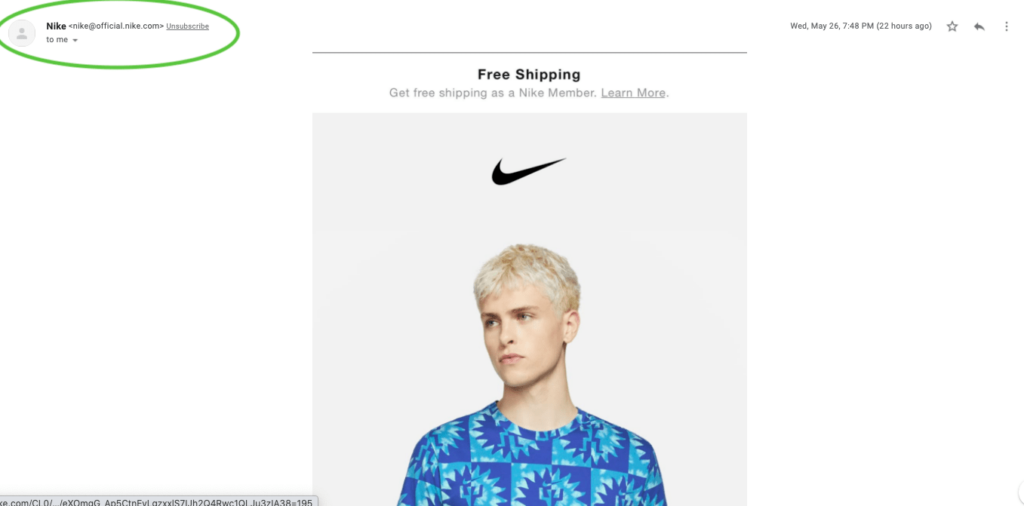To brand, or not to brand. ‘Tis the question. Generally, brands should send business emails from a branded company account. Like Nike, sends emails…
Generally, brands should send business emails from a branded company account. Like Nike, sends emails to their subscribers with the sender name Nike from the email address nike@official.nike.com.

If you’re sending an email from your company, your brand’s sender name and email address should follow a similar format. A branded format ensures that subscribers recognize that the email is from you and can trust the contents of the email.
But that doesn’t mean you have to send every company email from the same sender name and email address. If you have a recognizable individual at your company, you can (and should) use this to your advantage!
Sending from a thought leader from your company, especially someone with a strong personal brand, can have a profound impact on open rates and your ultimate goal.
For example, a university may have lackluster open rates on COVID updates from their university account but an email from a beloved University Chancellor may have more luck. Or if you happen to work for Berkshire Hathaway, sending an email from Warren Buffet would send open rates soaring.
Just remember when sending emails from individual accounts that they should be branded as well.
Send from an address like brad@business.com, ceo@business.com, or chancellor@university.edu. As with your company email, formatting your brand’s individual email address to send signals of legitimacy is very important.
If you’re a bigger brand, like Nike or Harvard, we suggest sending emails from an individual sparingly. Use this tactic as an ace in the hole for important projects or sensitive company updates. For instance, a university may send an email to alumni from their Chancellor to encourage them to contact state reps about a bond.
The delight and surprise of receiving an email from a thought leader can quickly dissipate. This means that you should carefully measure the importance of your project before adding this to your communications plan.
But for smaller brands, like a YouTuber (who owns a business with another name) or a local plumber, this tactic can be used time and time again.

YouTuber’s, especially those who break the 3rd wall, have a strong bond with their subscribers. These subscribers are going to be more inclined to engage with an email from Brandon that they watch on YouTube every week versus Brandon’s company. However, this doesn’t mean Brandon can’t use his personal brand to boost his business.
Sal the local plumber can also use this tactic when asking for Google Reviews. When sending from Sal@SalsPlumbing it makes customers think more about helping out the friendly man who fixed their problem instead of a faceless company.
This tactic is particularly effective when the email is personalized to the customer and project.
Regardless of the entity (Non-profit, Big Business, Small Business) the key to a successful email from an individual is authenticity. Ideally, this email from an individual is truly from that individual. Meaning they wrote it (at least contributed) or they appear in a linked video message.
But that isn’t always going to be the case. CEOs, Founders, Chancellors are extremely busy people. They understand marketing is important but your marketing email is probably sitting pretty low on their list of priorities. So if you decide to send an email “from” them, make sure it matches their voice, adds value, and that you have their permission to hit send.
When you attach a name to an email it sets expectations higher than if it’s just another email from your brand. If your message fails to meet your subscribers’ expectations, it not only damages your brand but also the brand of your thought leader.
Copyright © 2017-2024 · Carbon Digital · All Rights Reserved.